
Anthropology & Aging
Scope & Guideline
Unlocking Insights into Aging Across Cultures
Introduction
Aims and Scopes
- Cultural Perspectives on Aging:
The journal emphasizes the importance of understanding aging through various cultural lenses, exploring how different societies conceptualize and manage the aging process. - Interdisciplinary Approaches to Elder Care:
It encourages interdisciplinary research that integrates anthropology with fields such as sociology, psychology, and gerontology to provide a holistic view of elder care. - Impact of Technology on Aging:
The exploration of how technological advancements affect the lives of older adults is a core area, addressing both the benefits and challenges posed by new technologies in care settings. - Migration and Aging:
The journal investigates the experiences of aging in the context of migration, focusing on how older migrants navigate their identities and care needs in new environments. - Social Justice and Aging:
A strong emphasis is placed on issues of inequality, access to care, and the rights of older adults, advocating for social justice and policy change to improve elder care.
Trending and Emerging
- Care Technologies and Innovations:
There is a growing interest in how care technologies, including robotics and digital health tools, are transforming elder care practices and the implications for older adults' wellbeing. - Intersectionality in Aging Research:
An increasing focus on intersectionality highlights how age, gender, ethnicity, and socio-economic status intersect to shape the experiences of aging, leading to more comprehensive studies. - Community and Belonging:
Research that explores themes of community, belonging, and social networks among older adults is on the rise, emphasizing the importance of social ties for mental and emotional health. - Global Perspectives on Aging:
The journal is expanding its scope to include more global perspectives, particularly from non-Western contexts, which enriches the understanding of aging as a universal yet culturally specific experience. - Narratives and Storytelling in Aging:
There is an emerging trend in utilizing narrative and storytelling as methodologies to capture the lived experiences of older adults, allowing for deeper insights into their identities and challenges.
Declining or Waning
- Traditional Models of Aging:
Research focused solely on traditional, biomedical models of aging is becoming less frequent, as the journal increasingly prioritizes holistic and cultural perspectives. - Generational Studies Without Contextualization:
Studies that examine aging strictly through generational lines, without considering cultural and social contexts, are waning in favor of more nuanced, intersectional analyses. - Aging in Isolation:
There has been a noticeable decrease in research that examines aging in isolation from family or community dynamics, as the journal shifts towards exploring interconnectedness and social networks. - Homogeneous Aging Experiences:
The portrayal of aging as a uniform experience across different demographics is less common, with more emphasis placed on diversity and the unique challenges faced by various groups. - Focus on Economic Aspects of Aging:
While economic factors are still relevant, there is a decline in articles that solely address financial issues related to aging, as the journal expands to include broader socio-cultural discussions.
Similar Journals
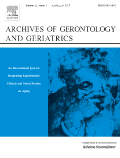
ARCHIVES OF GERONTOLOGY AND GERIATRICS
Empowering research for a healthier aging society.The Archives of Gerontology and Geriatrics, published by Elsevier Ireland Ltd, is a leading journal in the fields of Aging and Geriatrics and Gerontology. With an ISSN of 0167-4943 and an E-ISSN of 1872-6976, it has established itself as a crucial platform for disseminating high-quality research focused on the biological and psychosocial aspects of aging. The journal holds an impressive Q2 ranking in both Aging and Geriatrics and Gerontology, and a Q1 ranking in Gerontology and Health (Social Science) as of 2023, reflecting its significant impact in these disciplines. Additionally, the journal is ranked #33/371 in Social Sciences (Health) and #5/39 in Nursing (Gerontology) according to Scopus, showcasing its esteemed position in the academic community. Although currently not open access, the journal offers a wealth of research articles from 1982 to the upcoming 2025 that are vital for stakeholders including researchers, healthcare professionals, and students aiming to advance their understanding of aging processes and policies. Titles published within its pages contribute to shaping agendas in public health and gerontological practice, making it an essential resource for those involved in the study of the elderly population.
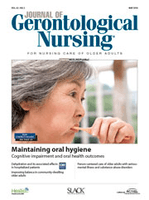
Journal of Gerontological Nursing
Exploring the Future of Elderly CareThe Journal of Gerontological Nursing, published by SLACK INC, is a leading peer-reviewed journal dedicated to advancing the field of gerontological nursing through innovative research, clinical practice, and educational advancements. Since its inception in 1975, this journal has become a crucial resource for researchers, healthcare professionals, and students interested in the care and management of older adults. With an impact factor that reflects its significance within the disciplines of gerontology and nursing (Category Quartiles: Q3 in Gerontology and Q3 in Nursing), it serves as a platform for disseminating vital findings, best practices, and evidence-based approaches aimed at improving the quality of life for the aging population. While the journal maintains a print-only format, its content is invaluable for those looking to stay ahead in the rapidly evolving landscape of gerontological care. As it continues to publish until 2024, the Journal of Gerontological Nursing invites contributions that foster dialogue and innovation within this essential area of healthcare.
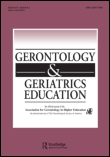
GERONTOLOGY & GERIATRICS EDUCATION
Innovating educational practices for the elderly.GERONTOLOGY & GERIATRICS EDUCATION, published by Routledge Journals, Taylor & Francis Ltd, stands as a significant resource in the realms of education and gerontological studies. With its ISSN 0270-1960 and E-ISSN 1545-3847, this esteemed journal has been disseminating knowledge since 1980, aiming to bridge the gap between educational practices and the growing field of gerontology. The journal's inclusion in both the Q2 category for Education and the Q3 category for Geriatrics and Gerontology highlights its commitment to improving educational methodologies that address the needs of an aging population—an essential focus given the increasing demographic shift toward older age groups. With substantial rankings within Scopus, notably as #549 out of 1543 in Social Sciences Education and #74 out of 116 in Medicine Geriatrics, GERONTOLOGY & GERIATRICS EDUCATION not only supports current research trends but also facilitates the exchange of innovative ideas and practices that impact the learning experiences and professional development of caregivers and educators alike. It serves as an invaluable venue for researchers, practitioners, and students eager to advance their understanding and expertise in geriatric education.

Geriatrie et Psychologie Neuropsychiatrie du Vieillissement
Elevating Knowledge in Geriatric Psychology and NeuropsychiatryGeriatrie et Psychologie Neuropsychiatrie du Vieillissement is a pivotal academic journal dedicated to the multidisciplinary study of aging, encompassing the fields of geriatrics, neuropsychiatry, and psychological health in the elderly population. Published by JOHN LIBBEY EUROTEXT LTD, this journal fosters knowledge dissemination and innovation, contributing to the understanding of the complexities faced by aging individuals. With a broad scope that includes biological psychiatry and neuropsychology, it serves as a vital resource for researchers, healthcare professionals, and students engaged in geriatric medicine and mental health. Although currently classified in the Q4 category across various relevant medical and psychological disciplines, the journal addresses critical topics that are essential for enhancing quality of care and improving patient outcomes. Additionally, the journal is accessible via open access options, promoting wide-ranging readership and collaboration within the academic community. As the field continuously evolves, Geriatrie et Psychologie Neuropsychiatrie du Vieillissement remains commited to pushing the boundaries of research and practice in gerontology and neuropsychiatry.

Ageing International
Exploring the Dynamics of Ageing Across CulturesAgeing International, published by SPRINGER, is a distinguished journal that has been at the forefront of scholarly research in the field of gerontology and aging studies since its inception in 1974. With an ISSN of 0163-5158 and an E-ISSN of 1936-606X, this journal provides a platform for high-quality, peer-reviewed articles that address the multifaceted aspects of aging on both individual and societal levels. Recognized as a Q2 category journal in Health (social science) for 2023, Ageing International plays a critical role in disseminating knowledge that influences practice, policy, and future research directions in the ever-evolving landscape of aging. Researchers, professionals, and students will find this journal indispensable for staying current with cutting-edge analyses and discussions, as it holds a Scopus rank of #168 in the social sciences realm, placing it within the 54th percentile of its category. Although it does not offer an open-access model, its extensive archive and ongoing contributions to the literature make it essential reading for anyone engaged in understanding the challenges and opportunities of aging in society. The editorial office is located at ONE NEW YORK PLAZA, SUITE 4600, NEW YORK, NY 10004, UNITED STATES, further emphasizing its dedicated presence in the academic community.

EXPERIMENTAL AGING RESEARCH
Advancing the Science of AgingEXPERIMENTAL AGING RESEARCH, published by Taylor & Francis Inc., is a leading journal that has been at the forefront of aging research since its inception in 1975. With an ISSN of 0361-073X and an E-ISSN of 1096-4657, this journal has earned a notable reputation, including a Q3 ranking in the field of Aging and impressive Q1 and Q2 rankings in Arts and Humanities and Geriatrics and Gerontology respectively. This positions the journal within the top percentile of its category, highlighting its significant impact and contribution to the scientific community. Covering a broad scope that intersects various disciplines, EXPERIMENTAL AGING RESEARCH aims to disseminate pioneering research, foster interdisciplinary collaboration, and provide a platform for innovative studies that enhance understanding of the aging process. While it currently does not offer Open Access, researchers and academics can access its rich repository of knowledge that spans multiple facets of aging, from physiological changes to psychological impacts. As the field of aging continues to evolve, this journal remains an essential resource for researchers, professionals, and students dedicated to advancing knowledge and practices concerning aging and longevity.
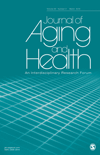
JOURNAL OF AGING AND HEALTH
Connecting research and policy for aging excellence.The JOURNAL OF AGING AND HEALTH, published by SAGE PUBLICATIONS INC, is a preeminent peer-reviewed journal dedicated to advancing research in the field of gerontology and related disciplines. With an impressive impact factor and ranked Q1 across multiple categories including Community and Home Care, Geriatrics and Gerontology, and Health (Social Science), this journal has established itself as a vital resource for academics, clinicians, and policymakers alike. Spanning over three decades of publication from 1989 to 2024, it serves as a platform for innovative research and multifaceted discussions on aging, health, and the interplay of social factors influencing the elderly population. The journal's rigorous standards for publication ensure high-quality contributions that are impactful and relevant, making it an essential read for those dedicated to improving the health and quality of life for older adults. Although it is not an open-access journal, it provides comprehensive insights that are critical to understanding the complexities of aging in today's society.

Canadian Geriatrics Journal
Exploring the complexities of geriatric health.Canadian Geriatrics Journal, published by MULTIMED INC, is a prominent platform dedicated to advancing the field of geriatrics and gerontology. With its esteemed status as a Q2 journal in both Geriatrics and Gerontology categories for 2023, it ranks favorably within the academic community, holding a 73rd percentile in Nursing Gerontology and a 59th percentile in Medicine Geriatrics and Gerontology according to Scopus metrics. Since its inception in 2011, the journal has aimed to foster innovation and disseminate pivotal research that addresses the complexities of aging populations. Researchers, healthcare professionals, and students interested in the intricacies of geriatric care will find a wealth of open-access resources that contribute significantly to enhancing practice and care methodologies in Canada and beyond. With its address located at 66 Martin St, Toronto, ON L9T 2R2, Canada, the journal stands as a vital resource for stakeholders in the geriatric field.

BIOGERONTOLOGY
Innovating Insights into Aging and Geriatric HealthBIOGERONTOLOGY, published by SPRINGER, is a premier journal dedicated to the interdisciplinary study of biological aging processes and their implications for health and longevity. With an ISSN of 1389-5729 and an E-ISSN of 1573-6768, this journal features cutting-edge research that addresses critical questions in the fields of aging, geriatrics, and gerontology. Ranking impressively in the top quartiles, particularly as Q1 in Gerontology, BIOGERONTOLOGY is recognized for its contributions to advancing the understanding of aging at both molecular and systemic levels. The journal’s rich repository of scholarly articles provides valuable insights for researchers, healthcare professionals, and students alike, fostering a deeper comprehension of age-related biological mechanisms. Although not an open-access journal, it is highly regarded with an impact factor that reflects its significant role in the academic community. The journal spans from 2000 to 2024, ensuring a broad historical context for its studies, and is based in the Netherlands, with its administrative office located at One New York Plaza, Suite 4600, New York, NY 10004, United States. Engaging with BIOGERONTOLOGY means joining a global dialogue on the science of aging and the implications it holds for humanity.
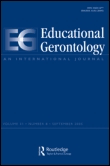
EDUCATIONAL GERONTOLOGY
Innovating educational practices for a vibrant older generation.EDUCATIONAL GERONTOLOGY, published by Taylor & Francis Inc, is a leading academic journal dedicated to the study of education and aging. With an ISSN of 0360-1277 and an E-ISSN of 1521-0472, this journal has been an essential resource since its inception in 1976, continuing to provide invaluable insights until 2024. As an authoritative platform in the fields of Education and Gerontology, it ranks in the Q2 category for Education and Q3 in Geriatrics and Gerontology, reflecting its significant contribution to these domains. The journal is well-regarded for its rigorous peer-reviewed articles that explore innovative educational practices for older adults and address the challenges faced by this demographic. Researchers, professionals, and students alike can benefit from the multidisciplinary approaches and comprehensive research findings presented within its pages, making it a vital tool for advancing knowledge and practice in educational gerontology.